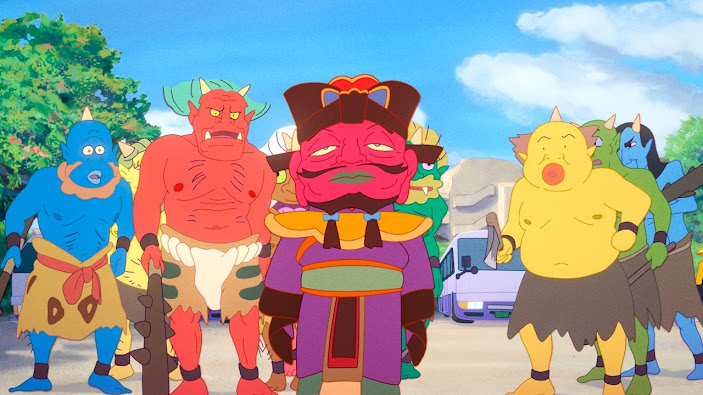Here's a nice surprise. I find Japanese anime to be hit and miss, and the first look at this boof-headed feline didn't promise too much, but Ghost Cat Anzu knocked the bails off. It riffs on the Ghibli theme of children being forced to grow up quicker than they should, with 11 year-old Karin (Noa Gotô) as our focus. Her dad's a bit of a scally and he does a runner while visiting his father at his temple home in a sleepy town, leaving Karin alone with kindly grandad and huge, anthropomorphic cat, Anzu, voiced by Mirai Moriyama.
Karin wanders the town, waiting for dad to return and meeting various locals, while being casually monitored by Anzu. The pace is a little pedestrian but the shenanigans make up for this. Anzu is pulled over by the police and told he needs a license to ride a scooter, though he protests that he's not actually a human, so surely these rules don't apply. He works as a masseur but also takes a gig to scare birds away from the river, roping Karin in as well. He cooks for the 'family', makes 'oyaji gags' (Dad jokes) and farts a fair bit.
The story gets going when Karin's dad doesn't return on the anniversary of her mother's death like he said he would. Anzu is tasked with escorting her to Tokyo to visit the grave, much to his delight. Unpaid bills mean they can't visit above ground, so Anzu engineers an opportunity, via the God of Poverty, to meet Karin's mum in the underworld. It's tricky to summarise the film as there are quite a few elements in play, needless to say, things go a bit pear-shaped in 'Jigoku'.
The film began life as a manga book by Takashi Imashiro and was filmed first as live action, then rotoscoped to provide a realistic (?) style animation - think Ralph Bashki's The Lord of the Rings, Richard Linklater's A Scanner Darkly, and Aha's Take on Me film clip. Ghost Cat Anzu uses this style to land somewhere between Crayon Shin-chan, and the paintings of Hasui Kawase, sometimes rudimentary, at other times beautiful.
There are many moments where the influence of Ghibli is noticeable, particularly Sen to Chihiro no Kamikakushi (Spirited Away), and the blend of reality and the spirit world is successfully imagined. The scene where the forest folk (sorry, I didn't get to them) are warned about the trip to the underworld is a highlight, reminiscent of a classic domino effect in Jeunet and Caro's The City of Lost Children.
Writer Shinji Imaoka, and directors Yokô Kuno and Nobuhiro Yamashita inject the scenario of a dead or dying parent, usually mother, quite popular in Japanese anime, I guess to provide the motivation for the child, as well as the pathos. Admittedly, this is pretty affecting here and the reunion between Karin and her mother acts as impetus for Karin's growth and maturity, leading to a choice at film's end. This is a proper little charmer, in the skin of a kid's cartoon.
Ghost Cat Anzu opens Dec 5th at the Luna cinemas.
See also:
Some Ghibli would be worth a tickle here, namely the above-mentioned Spirited Away (2001) and The Boy and the Heron (2023), both directed by the master, Hayao Miyazaki.





Comments
Post a Comment